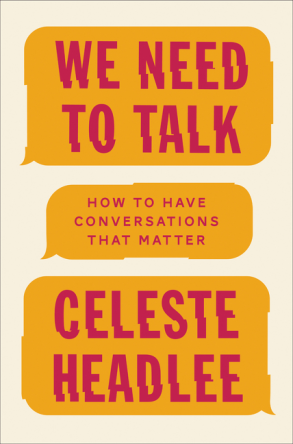By Meg Walker
22nd Oct 2017
22nd Oct 2017
We’re losing the all-important skill of verbal communication. A radio journalist, Celeste Headlee knows more than most the best ways to get a conversation going. MEG WALKER garners her advice and vows to pick up the phone a little more often.
HUMAN BEINGS ARE BETTER AT COMMUNICATION THAN ANYTHING ELSE. It’s the one thing we do better than any other species. We are evolved especially to be expressive when we speak and able to detect subtle changes in the tone of someone else’s voice or spot facial expressions and body movements. Good communication has three parts: words (the vocabulary we use), body language, and tone of voice. When you text or email, you’re dumping two-thirds of the meaning from what you say.
MANY OF THE MOST INCREDIBLE ADVANCES HAVE BEEN MADE IN COMMUNICATION TECH. The average adult in the US spends almost 30 minutes texting, and only six minutes on the phone. Most workers would rather send an email than call someone on the phone. So, we’re letting digital communication, which is inexact and prone to miscommunication, replace face-to-face or voice-to-voice conversations. Research shows our closest friends and family are no better at detecting sarcasm in our emails than strangers off the street. We tend to be ruder in email, less open to negotiation, and more likely to escalate conflict. So the dominance of digital communication isn’t good news if you care about open, honest, courteous conversation.
LISTENING IS ABSOLUTELY CRUCIAL. A good conversation contains an equal amount of talking and listening so that we really hear what others say and respond instead of waiting for them to take a breath so we can insert our own thoughts. I’m not sure human beings have ever been particularly good at listening. Anyone who’s taken care of an infant knows that we are not born listening, but screaming. We have to learn how to listen, and it takes e ort and energy to listen in an engaged, active way. My favourite quote comes from [American businessman and author] Stephen Covey, who said, “Most people do not listen with the intent to understand; they listen with the intent to reply.” That’s even more true in recent years, with the rise of smartphones and social media that encourage all of us to have opinions, to use Google to make us believe we’re experts on everything, and to share our opinions on almost any topic as quickly as possible.
EMPATHY IS DIFFERENT FROM SYMPATHY. Sympathy allows us to feel sorry for someone else, while empathy helps us feel with that person. It allows us to put ourselves in someone else’s shoes and understand why they think as they do. If you’re trying to work together in an office, that skill is essential. Empathy is what allows us to understand how others may feel about criticism or sexual harassment. Empathy also allows us to provide better customer service. If your employee comes to you with a complaint, empathy allows you to imagine yourself in the same position and therefore understand how your employee might feel and how best to address it.
EMAIL IS A TERRIBLE WAY TO DISCUSS COMPLICATED ISSUES. Email does some things well, like send attachments or recap meetings, but email shouldn’t be trusted for conversations that require nuance or compromise. When people want to communicate via email, I tell them,“This doesn’t seem like something we can work out over email. Give me a time when you might have five or ten minutes to discuss this over the phone.”
SINCE THE YEAR 2000, OUR ATTENTION SPANS HAVE DROPPED TO ONLY EIGHT SECONDS, which is one second shorter than that of a goldfish. We lose concentration after eight seconds, and that’s partly because the internet encourages us to constantly click links. We barely skim a couple of paragraphs of an article before clicking over to another page. Since we rarely speak for less than eight seconds at a time, this behaviour can make us tire of others very quickly and stop listening. Social media also rewards jokes and insults and “hot takes” with likes and up-votes. at kind of behaviour is now cropping up in real-life interactions, where we are learning to keep conversation on a superficial level, with witty jokes and funny lines. We are not at our best online and, sadly, our online personas are intruding into the real world.
MY ADVICE TO THOSE WHO LOSE PRECIOUS HOURS ON SOCIAL MEDIA IS… Set some limits. Make some rules, like: no phones during meals, or no social media past 7pm. Also, turn off your notifications for apps. You don’t need to know every time someone likes your pic on Instagram or comments on your Facebook post. Your phone is already distracting you, so do what you can to make it less distracting.
LET’S TALK
Celeste Headlee’s five tips to help you learn to communicate more effectively…
1. Enter conversations prepared to learn, not to educate.
2. Have genuine curiosity about other people and their perspectives.
3. Prepare yourself to hear opinions you may not like or agree with and commit to listening with respect and patience.
4. Listen to everything someone has to say, instead of deciding quickly what you want to say and simply waiting for a chance to say it.
5. Start talking to strangers again. Stop avoiding those casual chats with taxi drivers and baristas and people waiting in line at the supermarket.
 We Need To Talk: How to Have Conversations That Matter by Celeste Headlee (Piatkus, approx €16) is out now.
We Need To Talk: How to Have Conversations That Matter by Celeste Headlee (Piatkus, approx €16) is out now.























